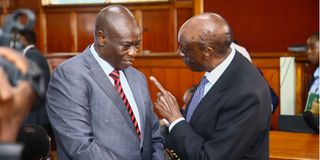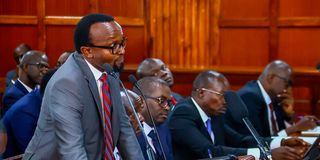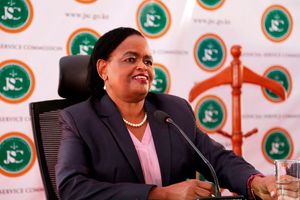
Deputy Chief Justice Philomena Mwilu (left) and former Deputy President Rigathi Gachagua.
Former Deputy President Rigathi Gachagua scored a major win on Friday after the Court of Appeal ruled that Deputy Chief Justice Philomena Mwilu had no powers to appoint a bench of judges to hear petitions challenging his removal.
Justices Daniel Musinga, Mumbi Ngugi and Francis Tuiyott said the Constitution reserves the duty to empanel a bench for the Chief Justice (CJ), and that assigning judges was not one of the administrative duties that could be allocated or passed over to the Deputy Chief Justice (DCJ).
“It has to be remembered that the duty to empanel is reserved for the Chief Justice by the Constitution, and we do not think it is one of those administrative duties that the Chief Justice can allocate or pass over to the Deputy Chief Justice by dint of section 5(2) of Judicial Service Act (JSA),” the judges said.
The judges said section 5(4) of JSA restricts instances when the DCJ can act as a CJ to only three instances which are in event of the removal, resignation or death of the Chief Justice.
The Court of Appeal has now ordered that the Chief Justice constitutes a fresh panel within 14 days to hear the matters afresh.
“The three matters shall immediately, in any event not later than 14 days from the date hereof be placed before the Honourable the Chief Justice for her Ladyship to empanel a bench under Article 165(4) of the Constitution to hear the matters,” the three judges ruled on Friday.
Welcomed by Gachagua's lawyers
The decision was welcomed by lawyers representing Mr Gachagua stating that the decision reverses any decisions made by the three-judge bench of the High Court comprising of Justices Eric Ogolla, Anthony Mrima and Freda Mugambi.

Impeached Deputy President Rigathi Gachagua with Senior Counsel Paul Muite at the Milimani High Court on October 22, 2024, for the hearing of two cases linked to his removal from office.
Mr Gachagua’s lead lawyer, senior counsel Paul Muite, said they were not concerned about the interim orders (blocking Prof Kithure Kindiki’s swearing- in), but were satisfied that the court had agreed with them that the bench was not properly constituted.
“What we are now waiting for is for the Chief Justice to appoint another bench to hear our petitions on merit, without delay,” he said.
Lawyer Ndegwa Njiru said as far as he was concerned, Mr Gachagua was still the deputy president because the appellate court had found that the DCJ had no powers to assign the judges.
“The bench was not properly constituted as per the ruling of the Court of Appeal. Anything made by the bench is therefore void ab initio. The (High) court could not vacate the orders stopping the swearing of Kithure Kindiki as the Deputy President,” he said.

Lawyer Ndegwa Njiru delivers his submissions during the Petitions challenging the impeachment of former Deputy President Rigathi Gachagua.
Mr Andrew Muge agreed saying the decision reverses all the decisions made by the court.
State downplays claims
But Principal State Counsel Emmanuel Bitta downplayed claims stating that the Court of Appeal judges declined to reverse the orders granted by the High Court.
“The request to reverse the order was declined by the court,” he said, citing paragraphs 210 and 211 where the judges refused to grant all the orders sought, insisting that they only allowed one prayer on the constitutionality of DCJ to appoint a panel of judges.

Principal State Counsel Emmanuel Bitta.
Mr Gachagua, through Mr Muite, had faulted the High Court in their ruling that stated that the DCJ had the powers to appoint the bench.
The three judges had ruled that the mandate exercised by the Chief Justice under Article 165(4) of the constitution- on appointment of benches to determine weighty constitutional issues, was an administrative function and the DCJ can assign judges when she is discharging any of the constitutional functions on behalf of the Chief Justice.
The bench said that the constitutional mandate exercised by the Chief Justice was an administrative function and the DCJ can handle the same in the absence of the Chief Justice, to ensure constitutional responsibilities are carried out seamlessly without disruption.
“In our view, and in line with the doctrine of continuity in governance, the drafters of our Constitution were deliberate in ensuring that the administration of duties and application of constitutional provisions remain uninterrupted,” said the judges.
The Court of Appeal, however, disagreed saying there was no evidence that the Deputy Chief Justice was the acting Chief Justice, or that there existed exceptional circumstances that permitted Justice Mwilu to exercise the mandate constitutionally reserved for the Chief Justice.
“Subsection (4) of section 5 of the Judicial Service Act contemplates three instances where the Deputy Chief Justice can act as Chief Justice, in the event of the removal, resignation or death of the Chief Justice. We have no doubt that the Deputy Chief Justice, when acting as a Chief Justice within the contemplation of section 5(4) of the JSA, can carry out the function obligated by Article 165((4) to empanel a bench,” said the judges.
The judges allowed only one of the prayers sought by Mr Gachagua by quashing the orders of the Deputy Chief Justice of October 18, 2024 assigning three of the ten petitions, challenging Gachagua’s ouster, to the three judges.
On situations when the CJ can be physically or temporarily incapacitated and there are cases requiring empanelment of benches, the judges said they do not think the CJ can be ‘electronically absent’ for an inordinately long period of time, such that she cannot empanel a bench or give appropriate directions.
They said the decision can be done electronically from nearly any part of the world.
“In this case, there was no suggestion that the Chief Justice was electronically unreachable, or physically unable to perform her constitutional administrative function,” added the court.
The judges further said no reason why it was not the Chief Justice who appointed the bench was communicated to the parties at the time of empanelment.
The court said it was critical for the reason or reasons why the Chief Justice did not exercise the reserved constitutional administrative mandate to be communicated to the parties and public — and set out in the empanelment order.
The court also declined to request to order Justice Koome to appoint a bench of five judges to hear the cases saying the discretion granted to the Chief Justice to empanel a bench is a power solely granted to the office.
“It is the Chief Justice, and she alone, who can decide the number of judges to assign a matter. Similarly, it is only the Chief Justice who can decide which judge to assign to a bench, and this answers the related prayer that we direct that the Chief Justice excludes the three named judges from the bench to be constituted afresh,” said the judges.






